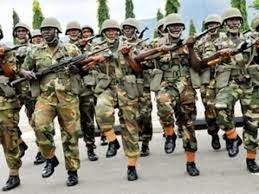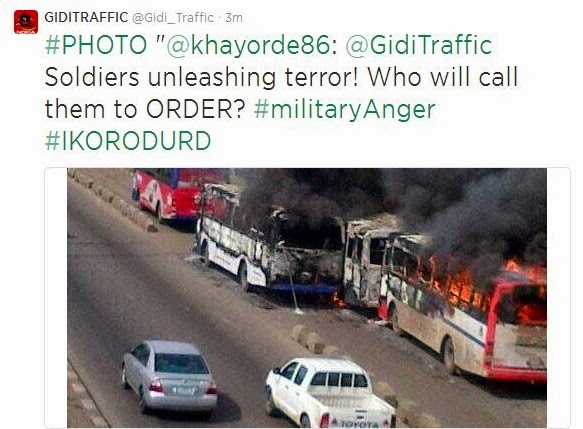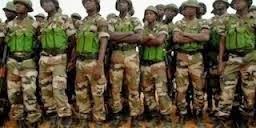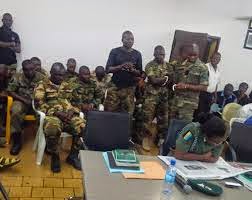
INSURBODINATE BEHAVIOUR IN THE MILITARY
 |
| Credits – sunnewsonline.com |
This is the 3rd
article in a series of posts relating to offences under the Nigerian Armed
Forces Act, the first was an article on the law on “Mutiny
under the Armed Forces Act” while the second was about “Disorderly
behaviour among Soldiers/Service men”.
article in a series of posts relating to offences under the Nigerian Armed
Forces Act, the first was an article on the law on “Mutiny
under the Armed Forces Act” while the second was about “Disorderly
behaviour among Soldiers/Service men”.
If you have
ever lived in a military barracks, attended a military school or know a thing or
two about the military, you will know the rule that the chain of command is
unbreakable and anyone who breaks it, gets broken, lol. The chain of command or
respect to seniority is sacred and it’s a big deal. Now imagine if a service
man strikes his superior officer, wow,make we just talk say him own don end
such soldier will definitely be
disciplined.
ever lived in a military barracks, attended a military school or know a thing or
two about the military, you will know the rule that the chain of command is
unbreakable and anyone who breaks it, gets broken, lol. The chain of command or
respect to seniority is sacred and it’s a big deal. Now imagine if a service
man strikes his superior officer, wow,
such soldier will definitely be
disciplined.
I attended a military
high school, Nigerian navy to be precise and I remember a day I was beating for
no reason by a senior student, I was so sure I didn’t deserve the treatment I
got and angrily walked off to report the senior student to one of the military
officers on deck. The military officer listened and asked me to go call thewicked
senior, he berated the senior for beating me for no apparent reason and asked
me to give the said senior 6 strokes from a horse whip. Oboy, did I gladly lash
the senior’s buttocks. After acting out my vengeance, the military officer asked
the senior to get up and said “this boy could come and report you to me because
you did not beat him well enough, now take him away”. Immediately I
heard those words, I knew it was time to draw up a will and last testament, I was
definitely going to die, the senior student just looked and said “follow me” as
he walked off to the senior dormitory.
high school, Nigerian navy to be precise and I remember a day I was beating for
no reason by a senior student, I was so sure I didn’t deserve the treatment I
got and angrily walked off to report the senior student to one of the military
officers on deck. The military officer listened and asked me to go call the
senior, he berated the senior for beating me for no apparent reason and asked
me to give the said senior 6 strokes from a horse whip. Oboy, did I gladly lash
the senior’s buttocks. After acting out my vengeance, the military officer asked
the senior to get up and said “this boy could come and report you to me because
you did not beat him well enough, now take him away”. Immediately I
heard those words, I knew it was time to draw up a will and last testament, I was
definitely going to die, the senior student just looked and said “follow me” as
he walked off to the senior dormitory.
I didn’t die
that day, obviously, else I won’t be typing this article many years after but
let’s just say, I have never forgotten that experience and I doubt if I ever
will. If my secondary school could be that devoted to the chain of command
without minding if a senior student had killed me that day, imagine what it
must mean to actually strike a superior officer in the military,serious
gbege i am sure.
that day, obviously, else I won’t be typing this article many years after but
let’s just say, I have never forgotten that experience and I doubt if I ever
will. If my secondary school could be that devoted to the chain of command
without minding if a senior student had killed me that day, imagine what it
must mean to actually strike a superior officer in the military,
gbege i am sure
Imagine a
scenario where a Major barks orders at a Sergeant to carry out a directive,
only for the Sergeant to slap the Major because the Major is his younger
cousin. Obviously, that will happen only in a Nollywood movie because Insubordinate
behaviour is completely frowned upon by the military; Section 54 of the Armed
Forces Act states that-
scenario where a Major barks orders at a Sergeant to carry out a directive,
only for the Sergeant to slap the Major because the Major is his younger
cousin. Obviously, that will happen only in a Nollywood movie because Insubordinate
behaviour is completely frowned upon by the military; Section 54 of the Armed
Forces Act states that-
“Any person subject to service law
who strikes or otherwise uses violence to, or offers violence to, his superior
officer; or uses threatening or insubordinate language to his superior officer,
is guilty of an offence under this section and liable, on conviction by a court
– martial, to imprisonment for a term not exceeding two years or any less
punishment provided by the Act”.
who strikes or otherwise uses violence to, or offers violence to, his superior
officer; or uses threatening or insubordinate language to his superior officer,
is guilty of an offence under this section and liable, on conviction by a court
– martial, to imprisonment for a term not exceeding two years or any less
punishment provided by the Act”.
It states further in subsection 2
that a person convicted for the offence stated above shall only be liable to be
imprisoned for no more than two years if the offence was committed on active
service or involved the striking or other use of violence, to the superior
officer exercising authority as such. A superior officer means an officer, a
warrant officer or its equivalent in rank, non – commissioned officer subject
to service law under the Act of superior rank, and includes an officer, a
warrant officer or its equivalent rank,or non – commissioned officer so subject
of equal rank but greater seniority while exercising authority as that person’s
superior.
that a person convicted for the offence stated above shall only be liable to be
imprisoned for no more than two years if the offence was committed on active
service or involved the striking or other use of violence, to the superior
officer exercising authority as such. A superior officer means an officer, a
warrant officer or its equivalent in rank, non – commissioned officer subject
to service law under the Act of superior rank, and includes an officer, a
warrant officer or its equivalent rank,or non – commissioned officer so subject
of equal rank but greater seniority while exercising authority as that person’s
superior.
Adedunmade Onibokun
@adedunmade




